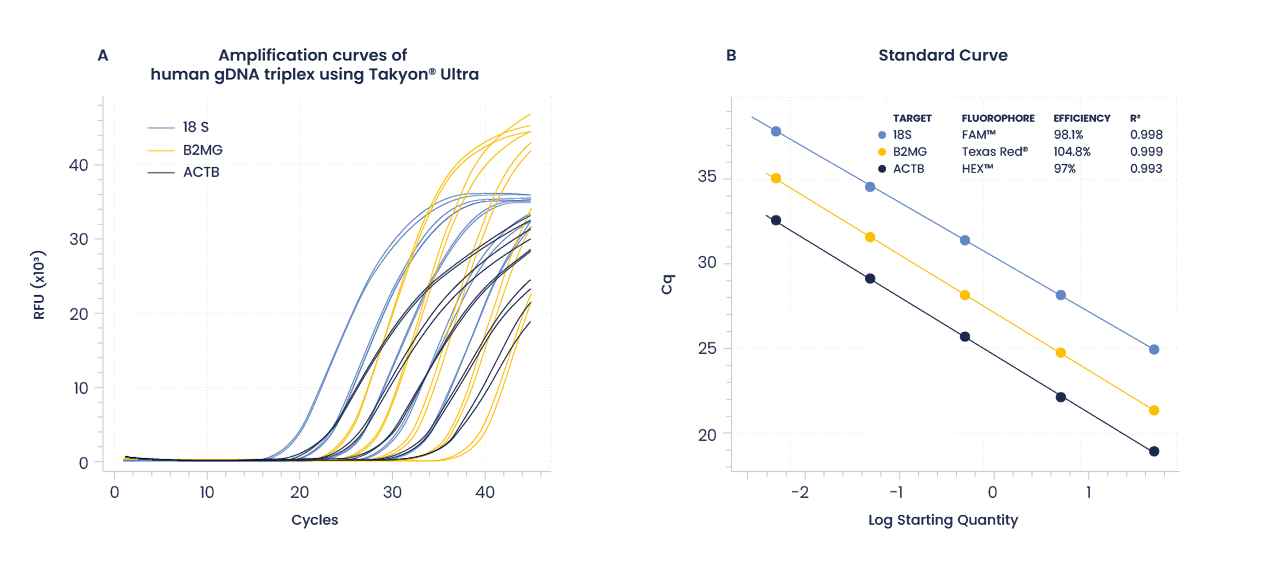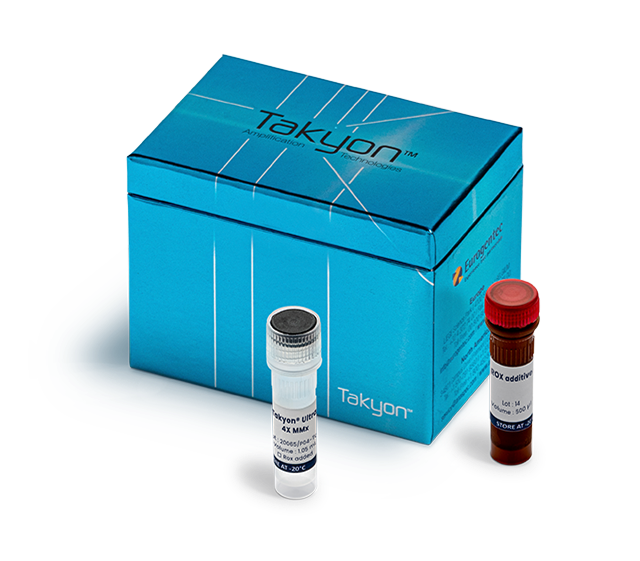Optimized Master Mix for qPCR applications
Takyon® Ultra for DNA targets
The Takyon® Ultra qPCR kit delivers reliable and accurate amplification for probe-based assays. Its robust, inhibitor-resistant formulation maintains high performance across diverse DNA targets and sample types, ensuring consistent results even in challenging applications.
x
Master Mix
Plex
Up to
Up to
20 µL RXNs package size
Why choose the Takyon® Ultra
qPCR Master Mix?
Based on our proprietary Takyon® enzymatic technology, the Ultra range for DNA applications is
assembled in cleanrooms. This guarantees a high-quality Master Mix. Its enhanced performance,
improved stability, and greater resistance to inhibitors make it the ideal choice for complex
samples with inhibitory components.
Assembled in cleanrooms
Each Master Mix is assembled and packaged in classified cleanroom environments to ensure the highest quality standards. This controlled manufacturing process minimizes contamination risks and guarantees reliable, reproducible performance in every batch.
Enhanced formulation
The Takyon® Ultra formulation delivers superior performance, sensitivity and stability. It enables the reliable detection of low copy targets, supports enhanced multiplexing efficiency and keeps the reagents stable for at least 48 hours at 20 °C, ensuring convenient automated workflows and easy high throughput assay setup.
Improved resistance to inhibitors
Takyon® Ultra delivers reliable amplification even in the presence of qPCR inhibitors thanks to the HotStart Takyon® fusion DNA polymerase. Its optimized formulation provides stable and reproducible results across diverse sample types, including environmental, clinical and food testing applications.
High sensitivity and consistency in
multiplex qPCR reaction
Takyon® Ultra enables simultaneous amplification of multiple DNA targets within the same
reaction, supporting reliable quantification across a broad dynamic range.

Fig 1. a) Amplification curves of human genomic DNA targets ACTB, 18S, and B2MG in a triplex qPCR reaction using Takyon® Ultra. Serial dilutions of gDNA were tested, ranging from 50 ng to 5 pg. Each condition was performed in technical triplicates.
b) Standard curves obtained for ACTB, 18S, and B2MG showing linear correlation between Cq values and input DNA quantity over five orders of magnitude.
Reactions were performed in triplicate following the manufacturer’s instructions.
The data demonstrate that Takyon® Ultra enables robust multiplex amplification with high sensitivity, reproducibility, and linearity, as confirmed by the tight grouping of replicates and high R² values (>0.99) across targets and dilutions.
Takyon® Ultra delivers consistent results
even at high-concentration of qPCR inhibitors
To meet the need for a qPCR Master Mix compatible with more complex sample types, we developed
Takyon® Ultra based on the robustness of our Takyon® range. Its enhanced formulation ensures
efficient amplification of DNA targets, even in the presence of high concentrations of common qPCR inhibitors.
| Inhibitors | ΔCq Takyon® (standard version) | ΔCq Takyon® Ultra (new version) |
|---|---|---|
| Tannic acid (20 ng/µL) | No amplification at high inhibitor concentrations | 0.84 |
| Ethanol (5 %) | 3.39 | 1.16 |
| Hemoglobin (50 µM) | No amplification at high inhibitor concentrations | 0.23 |
| Calcium (4 mM) | 2.3 | 1.25 |
| Humic acid (20 ng/µL) | No amplification at high inhibitor concentrations | 2.45 |
Tab 1. Inhibitors were added at the indicated concentrations, and amplification was carried out using a duplex reaction targeting ACTB and 18S genes. The table displays the average ΔCq values, representing the difference in Cq between reactions with inhibitors and those without inhibitors.
Inhibitory effect
ΔCq < 2 : minor effect
2 < ΔCq < 3 : moderate effect
ΔCq > 3 : strong effect
These results demonstrate the improved resistance of Takyon® Ultra compared to the standard Takyon® Master Mixes with samples containing high concentration of qPCR inhibitors.
Reliable performance matching
industry-leading qPCR mixes
Takyon® Ultra has been benchmarked against a leading qPCR kit to confirm that its performance
meets the highest industry standards. Comparative studies show that it delivers equivalent and
in some cases superior amplification efficiency and consistency, even with challenging sample
types containing high concentrations of inhibitors.
Superior heparin tolerance with Takyon® Ultra qPCR Master Mix
Fig 2. a) Amplification profile of the 18S rDNA target in duplex qPCR reactions using either the Takyon® Ultra kit or a competitor kit, across samples containing increasing concentrations of heparin (0 to 4 IU/mL).
b) Mean Cq values obtained with Takyon® Ultra qPCR Master Mix and the competitor kit. Each reaction was performed in triplicate under identical duplex assay conditions and in the presence of heparin at 0–4 IU/mL.
All reactions were run according to the respective manufacturer’s protocols.
The data demonstrate that Takyon® Ultra maintains efficient amplification even in the presence of high levels of heparin. In contrast, the competitor kit shows a progressive delay in amplification, with complete inhibition observed at the highest heparin concentration.
Reliable detection even at high concentration of hemoglobin
Fig 3. a) Amplification curves of the ACTB gene in qPCR duplex reactions using either Takyon® Ultra or a competitor kit across increasing concentrations of hemoglobin (0 to 50 mM).
b) Mean Cq values for Takyon® Ultra qPCR Master Mix and the competitor kit in the presence of 0, 15, 25, and 50 mM hemoglobin. Reactions were performed in triplicate, following the manufacturers’ protocols.
Takyon® Ultra maintains stable amplification efficiency with minimal Cq increase at higher hemoglobin levels, whereas the competitor’s kit shows a more pronounced delay in amplification especially at a high concentration.
Minimal impact of ethanol on amplification with Takyon® Ultra
Fig 4. a) Amplification curves of the ACTB gene in duplex qPCR reactions using either Takyon® Ultra or a competitor kit, in the presence of increasing ethanol concentrations (0% to 5%).
b) Mean Cq values obtained with Takyon® Ultra and the competitor kit across 0%, 1%, 3%, and 5% ethanol.
Reactions were performed in triplicate following each manufacturer’s instructions.
The data show that Takyon® Ultra maintains consistent amplification performance with minimal Cq variation, even at elevated ethanol levels. In contrast, the competitor mix exhibits strong inhibitory effect at high ethanol concentrations.
Simplified qPCR protocol
Its straightforward protocol allows fast and simple assay setup, saving valuable time. Thanks to
the ROX additive provided separately within the kit, Takyon® Ultra qPCR Master Mix is compatible
with all thermocyclers, integrating seamlessly into any laboratory workflow.



